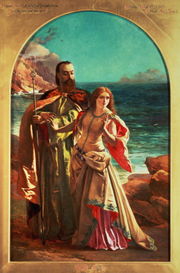.gif)
Miranda (Shakespeare)
Encyclopedia

William Shakespeare
William Shakespeare was an English poet and playwright, widely regarded as the greatest writer in the English language and the world's pre-eminent dramatist. He is often called England's national poet and the "Bard of Avon"...
's play The Tempest, Miranda is the beautiful daughter of the old Duke Prospero
Prospero
Prospero is the protagonist in The Tempest, a play by William Shakespeare.- The Tempest :Prospero is the rightful Duke of Milan, who was put to sea on "a rotten carcass of a butt [boat]" to die by his usurping brother, Antonio, twelve years before the play begins. Prospero and Miranda survived,...
.
Cast away with her father since she was three years old, she has lived an extremely sheltered existence. Though she has received a well-rounded education from her father, she is desperately lacking in real world experience. The fifteen year old does not choose her own husband; instead, Prospero sends Ariel, his spirit servant, to fetch Ferdinand while Miranda is asleep, and arranges things so that the two will come to love one another. Her sexual experience is limited to fighting off the lustful advances of her father's slave, Caliban
Caliban (character)
Caliban is one of the primary antagonists in William Shakespeare's play The Tempest.- Character :Caliban is forced into servitude on an island ruled by Prospero. While he is referred to as a calvaluna or mooncalf, a freckled monster, he is the only human inhabitant of the island that is otherwise...
, who tried to rape her. From her limited knowledge of the world, she assumes that all men are good:
With those that I saw suffer: a brave vessel,
Who had no doubt some noble creature in her,
Dashed all to pieces! O, the cry did knock
Against my very heart. (I.ii.6–9)
Another aspect of her is her tendency to get emotionally attached. Even as she watches the massive storm caused by her father she becomes emotionally entwined with the fates of the mariners, Miranda is very prone to emotions:
O, I have suffered
With those that I saw suffer! (I.ii.5–6)

Naïve realism
Naïve realism, also known as direct realism or common sense realism, is a philosophy of mind rooted in a common sense theory of perception that claims that the senses provide us with direct awareness of the external world...
girl, she also displays moments of great strength. For example in these lines—which many editors have transferred to Prospero—she sheds her usual passive role, scolding Caliban:
When thou didst not, savage,
Know thine own meaning, but wouldst gabble like
A thing most brutish, I endowed thy purposes
With words that made them known ... who hadst dissevered more than a prison (I.ii.354–359)
Miranda also challenges her father when she begs for the life of those on the ship, telling him: "Had I been any great god of power, I would have sunk the sea within the earth, or ere the good ship so have swallowed, and the fraughting souls within her!"

